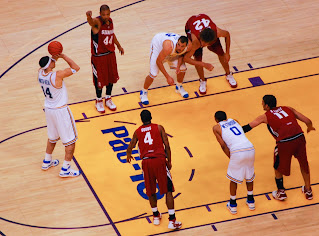You’re at the foul line in a 1-and-1 situation. If you sink both
shots you could tie the game … so the first shot is particularly critical. As
you picture this scenario, do you make the first shot? The second?
Eddie was a college sophomore who was going through a tough patch. Among the areas where he found himself struggling was at the free throw line. He was a proficient free throw shooter in practice, averaging well over 80% of his shots, but in a recent game before contacting me he had gone 2-for-9 from the line.
Against
a backdrop of some other problems, including an injury from which he was still
coming back, Eddie told me that the one thought that had been going through his
mind in that game was “What if I miss?”
When
I asked Eddie to tell me about the period in his life when his passion for
basketball was at its greatest he told me it was when he was 14, and he would
go out to the playground and practice his moves for hours.
In
recollecting this time in his life, Eddie recalled that it didn’t matter if he
missed a shot, he would just take another. It was the activity itself that was
fun, not the results.
He
also remembered a game in which he had scored 56 points. “I didn’t even notice
the crowd. I remember being really relaxed and not even caring about anything.”
I
pointed out to Eddie how the “not caring” was an element often associated with
being “in the zone” while his worry about whether the shot would go in was just
the opposite – a source of stress certain to keep him OUT OF THE ZONE.
I
also shared with Eddie how the thought “I hope I don’t miss” was directing his mind
to the very thing he DIDN’T want to happen: missing. I explained that if he was
standing at the free throw line with his CONSCIOUS self hoping to make the
basket while his SUBCONCSIOUS self focused on missing, he was expending energy
fighting himself. The mental tension he was creating was likely resulting in
physical tension as well. Eddie knew
that any shot is best taken when a player is relaxed, as Eddie was in the
56-point game, and he needed to stop working against himself.
Another
problem caused by his concern about missing is that it was FUTURE-focused
rather than present-focused. I explained to Eddie that he couldn’t control the
future, all he could control was the present, specifically if he took a fluid
shot, had a good release, etc. So by worrying about the RESULTS of his shot as
opposed to the QUALITY of the shot was also distracting him from his best
execution.
At this point I had Eddie close his eyes and picture himself at the line during the game in which he was struggling, and seeing himself taking the shots that he did. I then asked him to take several slow deep breaths, and afterwards I asked him how he felt. “Relaxed,” he told me. His body language confirmed this.
I
asked Eddie to close his eyes again and picture himself at the free throw line,
and when he was ready to see himself taking the shot, this time focusing only
on the quality of the shot and not worrying about the results. He saw himself
sinking the shot. He repeated this action two more times and felt very
comfortable that he could go out in games and remain FOCUSED and RELAXED at the
free throw line.
A
few days later Eddie got back in touch with me to say that he was more relaxed
but wanted advice regarding another problem that he had at the line.
“Sometimes
I hear a little voice inside of me saying, ‘You’re not that good a shooter.’” he told me.
While
my first inclination was to help Eddie deal with that part of him that would
throw out thoughts of doubt as to his ability to get the job done by helping
him to respond to that voice with some convincing thoughts (I call these
COMPELLING THOUGHTS because we so connect with them that they become our most
compelling voice, thus causing the other thoughts or voices to be effectively
silenced). However…after giving it a bit
of thought I decided that the most efficient way to help Eddie (that is, the
way that would be the quickest) was to give him a different strategy to silence
that voice by “changing channels.”
A
channel is a way that we experience things.
When he heard that voice he was in a COGNITIVE channel … what we call “being
in his head.” To stay in his head and
find the compelling arguments against the voice is an option, but I went for a
quicker one by explaining how he could change channels (“Think of it like you
are watching ESPN and then you change the TV to a different channel … then you
will no longer be receiving ESPN).
I
told him that when he heard that voice to focus on taking a few slow and deep
breaths, and to really focus on inhaling and exhaling: “Not only will this help
you relax, but it will get you to a different channel – in this case your body –
and away from your head. As a result you
will no longer be on the channel where this voice is transmitting from.”
Admittedly,
Eddie is still a “work in progress” … he recently contacted me about another
situation that got him out of his game – but that is for another article.
SORRY
THIS ARTICLE IS A BIT LONG BUT I HOPE YOU FIND IT HELPFUL!!
Did this article resonate with you? I welcome your thoughts/responses to this or any other article at MitchSmithMentalCoach@gmail.com All correspondence will be treated in full confidentiality.
